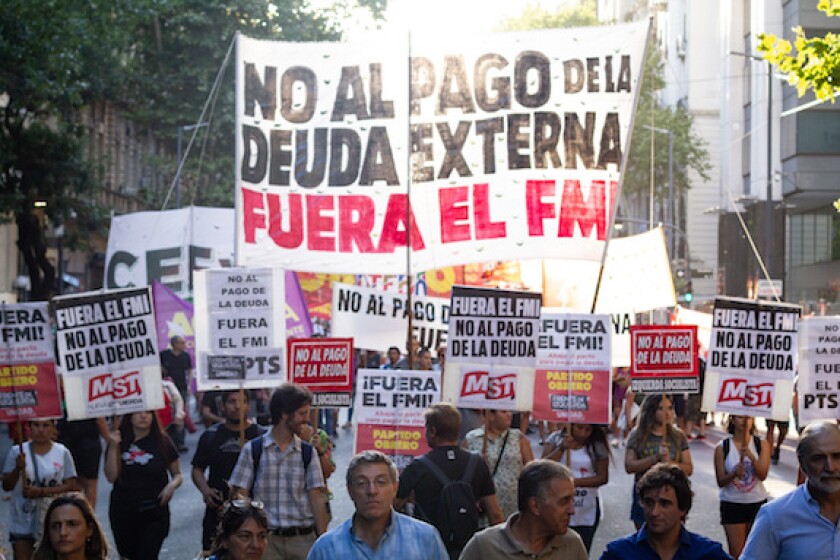People involved in the latest multi-billion dollar bond negotiations with Argentina and Ecuador were astonished to see some of the world’s largest investment managers racing to get up to speed on the ins and outs of sovereign restructuring.
These deals constituted largely unchartered territory for most of the so-called “real money” funds that were these countries' largest bondholders. Sovereign restructuring have traditionally been the reserve of more opportunistic distressed debt specialists.
When crunch time arrived for this pair of highly stressed Latin American sovereigns earlier this year, however, the holders of most of the bonds were a veritable who’s who of the mainstream EM investment universe.
It is not clear whether these investors had consciously not wanted to get out early, or if they had suddenly found themselves unable to do so as bond prices in Argentina and Ecuador collapsed. And in Argentina, at least, these investors found themselves under unprecedented scrutiny.
During tense stand-offs, the government sought and achieved public support from a range of academics, multilaterals and politicians. Angry conversations between BlackRock and finance minister Martín Guzmán were leaked to local press and painted the US fund as a heartless and greedy predator ignoring the government’s pleas for relief while the population suffered.
For the sake of the EM asset class, we should hope that these funds have learnt from this experience are will be willing to play a major part in debt workouts in the future.
Clearly miffed at being framed as the bad guys, the so-called Ad Hoc Bondholder Group in Argentina often quoted — in unwavering public statements — their “fiduciary obligations” to their clients, “millions of savers around the world”, as the reason why they could not simply bow to Argentina’s demands.
Following this argument, it is preferable — for the sake of the ordinary person whose pension money is invested in EM debt — if real money funds continue to seek the higher recoveries offered by negotiated solutions, rather than panic-selling to distressed credit investors at rock-bottom prices.
The responsible choice
Moreover, if these investors are concerned about maintaining the socially responsible image that they spend millions cultivating, they should not let EM sovereign bonds — which they gobble up by the billion in good times — fall into the hands of the wrong people.
Though some Argentine creditors feel like negotiations were a never-ending nightmare, both Argentina and Ecuador's agreements were wrapped up in record time by any reasonable benchmark. As Capital Economics points out, the average sovereign debt restructuring since 1970 has taken seven years. Argentina’s last default lasted nearly 15 years. Ecuador defaulted in 2008 but could not return to bond markets until 2014.
A major factor in the speed of these deals is that the countries were negotiating with creditors who had a genuine interest in a peaceful denouement.
An investor with a long-term interest in the performance of emerging market debt does not want to see a sovereign issuer dragged through the courts for a decade. A post-restructuring story, if done sensibly, is usually a high performing one and positive for the EM indices in which these managers invest the savings of teachers, firefighters, and other regular citizens.
These portfolio managers are the ones likely to buy the country’s new debt when it eventually regains market access, so it is in their interest to leave this path open with a sustainable debt deal.
Finally, that same investor may well also own shares or bonds from companies in the country that would be crippled by such a costly, litigious dispute.
In fact, reputational risk faced by the investor is a positive, balancing factor in restructurings. After all, an investment manager that does care about its reputation will maintain an interest in a swift outcome that benefits all parties in the long term.
Litigious hedge funds — for whom a bad reputation is part of the fun, and with compensation structures that incentivise managers to drive the hardest possible deal — are far more likely to bat away public criticism and take radical positions that inflict lasting damage on an economy.
Lengthy legal battles also represent a big reputational risk for the entire asset management industry. The average person does not differentiate between Paul Singer’s Elliott and Larry Fink’s BlackRock, so even the most socially conscious fund can find its reputation tarred by the behaviour of the opportunists.
Just look how quickly the Argentine press and politicians, scarred by memories of the previous legal disputes, began to label as “vultures” the very institutions that had lent the country billions of dollars since 2016, and are taking a hefty loss on their investment.
Negotiating with a defaulting issuer is never going to be painless. But we will be in a better world if these negotiations are between parties with incentives that are to some extent aligned.

